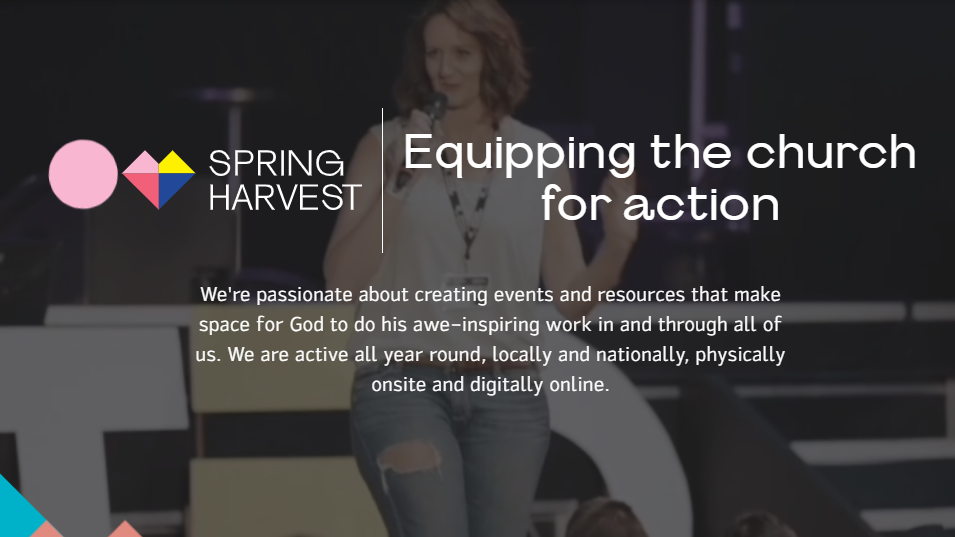It was great to be back at Skegness for Spring Harvest This was the fourth time I have spoken there having previously been at Minehead, Harrogate, as well as Skegness – prior to lockdown. There were only around 2,000 adults on site this year, which shows that things haven’t quite bounced-back to pre-Covid levels, but it was still really good to be there in person!
This time I was invited to lead three afternoon seminars. Spring Harvest’s leadership selected the topics I was to address in the sessions, and what they went for was: “Do Christians and Muslims Worship the Same God?”, “Sexuality: Is Christianity Oppressive?” and “How to Share Your Faith Without Getting Fired or Cancelled?” There were between 400-600 people there on each afternoon, depending on the topic. This year they put the afternoon seminars on a bigger stage, to make them available to more people, which seemed to work well. Running Q&A in large crowds is harder, but the stewards were really helpful, working a roving mic around the crowd to facilitate the questions.
The first seminar on Christianity and Islam was obviously based on the book I had published during lockdown. That was an enjoyable session to lead, and as a speaker you can always tell when an audience is engaged and tracking what you are saying, and this was a great audience – as became even more apparent in the really thoughtful ways issues were raised in the Q&A.
On the second afternoon, I was asked to look at one of the major objections to Christianity in our culture – that the Christian faith is oppressive in the area of human sexuality. It was brave of Spring Harvest to choose that topic because it is always an area of controversy and one which it is easier to avoid. I had just one hour to look at everything from sexuality to same-sex attraction to marriage and what that is, to transgender issues! What we really tried to focus in on was the issue of identity. It’s in that area that there is in fact a profound clash with the gospel because the gospel of Christ defines who we are. People today are encouraged to forge their own identity, but the gospel is about Christ giving us a new identity. But I tried to make it also very invitational, because Jesus turns nobody away because of their sexuality or where they are on the gender question. We are all asked to come to Christ and lay our lives before him and surrender all to him. Stephen McAlpine’s phrase is that we offer Christ a ‘blank cheque’ and there are implications for all of us in that. I referred to some of Rosaria Butterfield’s work in this area, which is incredibly helpful. Rosaria was a left-leaning academic, who was a lesbian, lecturing in queer theory in the English faculty of a major university – and is now a Christian; living a very different life in all those areas. In her article for the Gospel Coalition, she said that there are three errors that Christians make when addressing sexuality. The first is outright homophobia. That is present in the church, in terms of seeing people who identify as LGBTQI+ as different from the rest of humanity, or as being uniquely sinful – and that’s wrong. Secondly, the other error is to fail to confront practices which the Bible says are wrong. While Jesus certainly loves sinners, he does not condone sin and calling out sexual practices which the Bible says are wrong, is where the reaction comes back. Then thirdly, many Christians think that when someone comes to Christ, then all their issues will immediately be resolved. That’s not the case, and the church needs to be a place where people can work through these issues – even if that is not at the speed we might like. I drew extensively on the work of our friends at LivingOut too, folks like Ed Shaw and Anne Witton, and our old friend David Bennett too. The Q&A was lively, not everyone agreed with me; but I was able to say that I was espousing what Christians have believed through the history of the church and what biblically faithful same-sex attracted people are living and teaching today as well.
Then on the third afternoon we did, “How to Share Your Faith At Work Without Getting Fired Or Cancelled”. That was such an encouraging session because there were so many Christians there who really wanted to share their faith at work. Many were already active and wanted insights on how to do it better. It’s great in a session like this when you come to the Q&A and so many of the questions are really practical, not just theoretical. People described real conversations with colleagues and classmates and asked how to address their questions or objections more wisely. At the end of that session I was able to pray for the audience and their friends and ongoing conversations.


